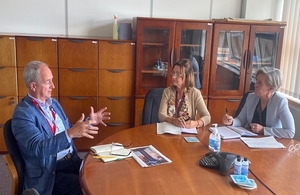Would you like to be the British High Commissioner to India for a day?
To celebrate the International Day of the Girl Child, the British High Commission is offering women from across India a unique opportunity to experience a day in the life of the UK’s top diplomat in the country. The competition is open to women aged 18-23 and the deadline to apply is 2 September 2022.
Alex Ellis, British High Commissioner to India, said:
The UK and India are doing big things together, from combating climate change to agreeing a free trade deal. But, celebrating the International Day of the Girl Child together with a wonderful young Indian applicant each year is without a doubt one of my favourite things to do as High Commissioner.
I am delighted to launch the sixth edition of our High Commissioner for a Day competition, particularly during the Azadi ka Amrit Mahotsav. Empowering women and girls is one of the UK’s top priorities globally, as it is for Prime Minister Modi as well. This is an excellent opportunity for young women to show their full potential. I look forward to seeing entries from every corner of this great country.
The winner of this pan-India initiative gets a unique opportunity to head the diplomatic mission for a day – overseeing the UK’s largest overseas network, chairing meetings with diverse stakeholders, and a chance to experience the UK-India partnership in action.
To apply to be the ‘High Commissioner for a Day’, participants must record and upload a one-minute video answering ‘which woman in public life inspires you the most and why?’ The video must be shared on either Twitter, Facebook or Instagram by tagging ‘@UKinIndia’ and using the hashtag ‘#DayoftheGirl’.
Further information
The British High Commission has organised the ‘High Commissioner for a Day’ competition annually since 2017. The theme for this year’s competition is ‘Women in Leadership’.
Last year’s winner was 20-year-old Aditi Maheshwari from Chittorgarh in Rajasthan, whose day as the High Commissioner included observing the India-UK Energy for Growth Dialogue, meeting with beneficiaries of the Chevening Alumni Programme Fund, interacting with climate experts from the Council on Energy, Environment and Water (CEEW), and meeting young leaders from the not-for-profit Global Youth.
Terms and Conditions:
-
A jury at the British High Commission (BHC) will select the winner, who will be announced on @UKinIndia social media channels. Only one entry per participant will be accepted. Multiple entries from the same person will be disqualified. The High Commission’s decision is final and no correspondence relating to the above will be possible.
-
By applying to the competition, participants transfer the copyright ownership of their videos to the BHC New Delhi. BHC may use these videos to produce content for future communication on its social media channels.
-
Participants are reminded not to share personal details in their video, post or tweet. The BHC is not responsible for the data that participants make public on these platforms.
-
The High Commissioner for a Day programme will take place in-person in Delhi (unless Covid-19 advice changes). In case the winner is not from Delhi/NCR, we will fund travel or accommodation to Delhi as part of the competition.
For media queries, please contact:
David Russell, Head of Communications
Press and Communications, British High Commission,
Chanakyapuri, New Delhi 110021. Tel: 24192100
Media queries: BHCMediaDelhi@fco.gov.uk
Follow us on Twitter, Facebook, Instagram, Flickr, Youtube and LinkedIn


